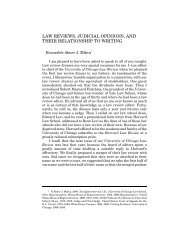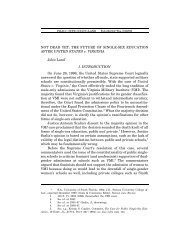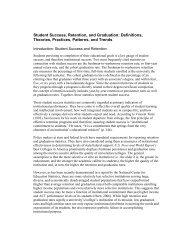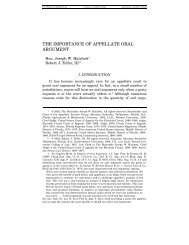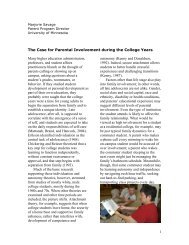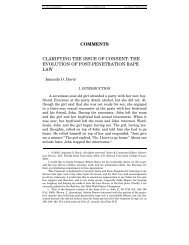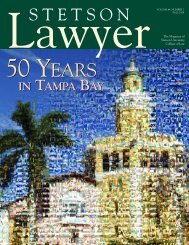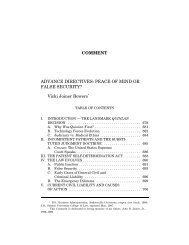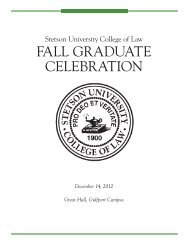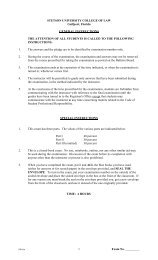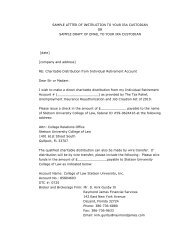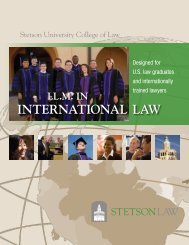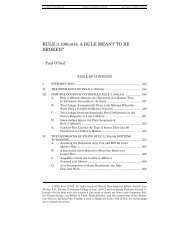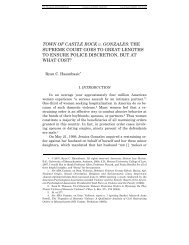Evidence-speak for Trial Lawyers - Stetson University College of Law
Evidence-speak for Trial Lawyers - Stetson University College of Law
Evidence-speak for Trial Lawyers - Stetson University College of Law
You also want an ePaper? Increase the reach of your titles
YUMPU automatically turns print PDFs into web optimized ePapers that Google loves.
C:\MyFiles\book\Articles.311\Galleys\Ohlbaum5.drb.wpd22 <strong>Stetson</strong> <strong>Law</strong> Review [Vol. XXXIWhen a witness reads a document out <strong>of</strong> context, the opponent may<strong>of</strong>fer any other part <strong>of</strong> the document or any other document thatrestores the context and “ought in fairness to be consideredcontemporaneously with it.” 44 While the rule applies to a variety <strong>of</strong>writings, 45 it is most <strong>of</strong>ten raised when a prior inconsistent statementis used to impeach a witness. As an alternative to delayedgratification, the rule permits the opponent to <strong>of</strong>fer additionaldocumentation during the impeachment. 46 For example, when awitness is challenged with an earlier statement or transcription <strong>of</strong>testimony in which the witness had taken a different position fromhis or her trial testimony, the rule permits the opposing lawyer tointroduce another section from the statement or transcript — or anyother document — that may help the witness explain the apparentinconsistency. 47A tight and crisply executed impeachment by an inconsistentstatement requires a witness to admit that he or she made astatement — it does not permit a witness to explain why he or shesaid it. Notwithstanding a cross-examination that provides room <strong>for</strong>the witness to say only, “Yes, I said it,” or “No, I did not say that,”judges <strong>of</strong>ten permit a challenged witness to explain the inconsistentstatement during cross-examination. When the witness eitherdenies making, or attempts to explain, the inconsistency, any part<strong>of</strong> that statement — or any other statement from the witness thatsupports the denial or explanation — may be admissible during theimpeachment. 48 By giving opposing counsel the opportunity tointerrupt an impeachment and insist on introducing the completedocument or other writing, Rule 106 provides the witness withadditional protection against the misuse <strong>of</strong> his or her earlierstatement. 49 A lawyer who gets caught misleading a jury during thecontemporaneously with it.44. Fed. R. Evid. 106.45. Popular examples <strong>of</strong> writings include prior statements, recorded recollections,business and <strong>of</strong>ficial records, miscellaneous <strong>of</strong>ficial records, and summaries. See generallyFed. R. Evid. 612 (giving requirements <strong>for</strong> a witness to use a writing to refresh his or hermemory); Fed. R. Evid. 613 (2000) (stating that a witness does not have to be shown his orher prior statement when examined as to that statement); Fed. R. Evid. 801 (giving theapplicable definitions under the hearsay rule); Fed. R. Evid. 803 (giving examples <strong>of</strong> writingsthat fall under hearsay exceptions); Fed. R. Evid. 1006 (2000) (stating that any writings thatcannot be conveniently examined due to the volume <strong>of</strong> the writing may be summarized).46. Fed. R. Evid. 106.47. Id.; Fed. R. Evid. 613(b).48. Fed. R. Evid. 106.49. Id.



